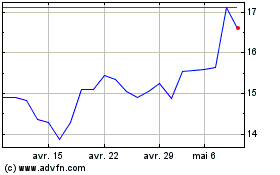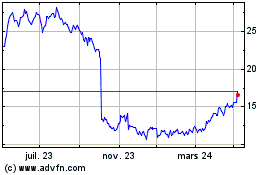Number of Blocked Deals Falls as Companies Pre-empt Regulators
14 Février 2019 - 11:15AM
Dow Jones News
By Ben Dummett
When the proposed train merger between Siemens AG (SIE.XE) and
Alstom SA (ALO.FR) was blocked by the European Union last week,
several observers seized on it as fresh evidence of a regulatory
clampdown on deal making.
But recent data show the number of deals blocked by regulators
is actually falling.
Last year, over 29 deals worth a total of at least $52.2 billion
across the U.S., the EU, Brazil, South Africa, Australia and Turkey
were either blocked or abandoned in the face of regulatory
scrutiny, well below the comparable 38 deals in 2017 that had a
total value of over EUR130 billion ($147.0 billion), according to a
report by Allen & Overy, a global law firm. Of the 29 deals,
seven were blocked, down 68% from the year before.
"After a bumper year of enforcement in 2017, it appears that the
landscape may now be beginning to stabilize," more in line with
levels in 2015 and 2016, Allen & Overy lawyers Antonio Bavasso
and Louise Tolley wrote in the report.
In certain cases, merger partners are completing deals because
they're showing a willingness to compromise to ease regulatory
concerns over issues such as gaining too much pricing power in
certain markets.
Germany's Linde (LIN.XE) and U.S.-based Praxair Inc. took that
route to win support for their merger to create an $80 billion
industrial-gas giant. Last summer the companies seemed poised to
complete their deal after striking separate deals to sell assets in
Europe, North and South America to Japan's Taiyo Nippon Sanso Corp.
(4091.TO) and a German consortium comprised of Messer Group GmbH
and CVC Capital Partners. But the deal faced an additional hurdle
imposed by the U.S. Federal Trade Commission that required Praxair
and Linde in October to sell more assets--this time striking deals
with LyondellBasell Industries NV (LYB) and Celanese Corp.
(CE).
That said, the number of cases in which companies agreed to
so-called remedies such as divestments to win antitrust approval
for their deals declined to 139 last year from 159 in 2016,
according to the Allen & Overy report.
The drop-off in blocked deals may be partly be explained by
companies giving up on a transaction before receiving a formal
ruling from antitrust authorities. Transactions abandoned in the
face of regulatory concerns but ahead of any formal ruling rose 38%
to 22 last year, according to the report, a possible sign more
companies could be growing wary of the risks of facing antitrust
reviews.
That's the route Qualcomm Inc. (QCOM) choose in July by dropping
its $44 billion bid for rival chip maker NXP Semiconductors NV
(NXPI) rather than extend the wait for Chinese antitrust regulators
to approve the tie-up that was caught up in the middle of rising
trade tensions between China and the U.S.
Still, the data suggest big M&A isn't being sidelined by the
threat of a review. Of the deals "frustrated" last year, the failed
Qualcomm-NXP deal represented 89% of the total value and only one
other "frustrated" deal exceeded $1.1 billion, the report
found.
Write to Ben Dummett at ben.dummett@wsj.com
(END) Dow Jones Newswires
February 14, 2019 05:00 ET (10:00 GMT)
Copyright (c) 2019 Dow Jones & Company, Inc.
Alstom (EU:ALO)
Graphique Historique de l'Action
De Mar 2024 à Avr 2024

Alstom (EU:ALO)
Graphique Historique de l'Action
De Avr 2023 à Avr 2024
